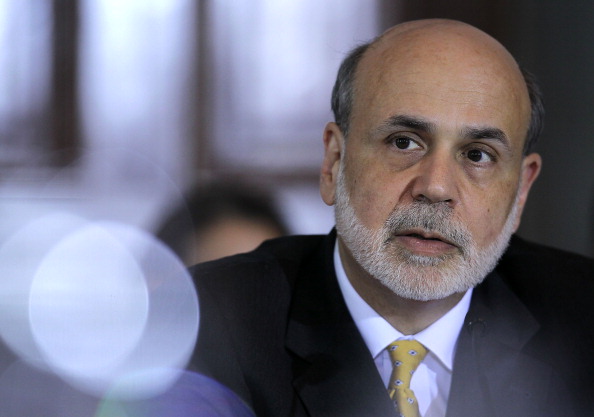This economics blogger is completely wrong about inequality and poverty
Yeah, his name is Ben Bernanke. And he's still wrong.


A free daily email with the biggest news stories of the day – and the best features from TheWeek.com
You are now subscribed
Your newsletter sign-up was successful
Former Chairman of the Federal Reserve Ben Bernanke, in between his new jobs at PIMCO and Citadel, writes a blog at the Brookings Institute. Recently he wrote on the potential effects of central bank policy on inequality (a topic my colleague Jeff Spross recently covered). Did Fed policy during the Great Recession make it worse? Somewhat, says Bernanke, but things could have been worse.
Bernanke makes some good points. But his treatment of inequality misses half the story. In fact, the Fed has been a major player in the rise of inequality, both before the crisis and after. His treatment of poverty, which he says is best addressed by higher wages, is similarly mistaken. Under market capitalism, there will always be a significant number of people who cannot work, and higher wages (though they are a good in themselves) are inferior to direct cash payments when it comes to fighting poverty.
The argument in question comes during a discussion of post-crisis Fed policy:
The Week
Escape your echo chamber. Get the facts behind the news, plus analysis from multiple perspectives.

Sign up for The Week's Free Newsletters
From our morning news briefing to a weekly Good News Newsletter, get the best of The Week delivered directly to your inbox.
From our morning news briefing to a weekly Good News Newsletter, get the best of The Week delivered directly to your inbox.
Perhaps most important, easier monetary policies promote job creation as well as increases in asset prices. A stronger labor market — more jobs at better wages — obviously benefits the middle class, and it is the best weapon we have against poverty. [Ben Bernanke's Blog]
The context here is quantitative easing (the "easier monetary policies" referenced) and its effect on asset prices. QE consists of purchasing a bunch of assets with new money in an attempt to inject money into the economy, which naturally tends to increase the price of assets in general. Most financial assets are owned by the rich, and so those increased prices worsen inequality.
Bernanke acknowledges this fact, but stresses that QE also boosted the labor market, which is what really matters for the non-rich. In a counterfactual alternate history without QE, the unemployment crisis would have been dramatically worse, and thus inequality would have been, too.
That's a fair point. But as Steve Randy Waldman explains, Bernanke is being quite slippery about his scope of argument. It's true that doing no stimulus at all would have been awful. The European Central Bank tried that until quite recently, and the result is literally worse than what happened during the Great Depression. But QE and no-QE were not the only imaginable choices. It's easy to imagine bolder monetary policies that would been very helpful to the 99 percent, particularly when you consider the extremely bold and legally questionable strategies the Bernanke Fed cooked up to save the banking system in 2008.
What's more, there is a solid case that the Fed was a major player in the long-term increase in inequality before the crisis. During the Great Moderation from 1980-2007, the Fed's preferred measure of inflationary pressure was, essentially, wage growth. The Fed tended to react to increases in wages by smothering them. As Waldman explains:
A free daily email with the biggest news stories of the day – and the best features from TheWeek.com
Unit labor cost is a very dirty measure of inflation. It is, quite precisely, an admixture of the price level and labor’s share of output. Put simply, as a matter of technocratic procedure, the Great Moderation Fed interpreted any increase in labor bargaining power as an event demanding a contractionary response, even if it was not accompanied by an acceleration of the overall price level. [Interfluidity]
That brings me to poverty, where Bernanke is even more clearly wrong. He says that higher wages are the "best weapon" against poverty. Setting aside the fact that the Fed worked long and hard against higher wages, this misunderstands the fundamental nature of poverty.
Because as Matt Bruenig has pointed out time and time again, over 80 percent of the officially poor are either elderly, disabled, the involuntarily unemployed, or children. These are people who by and large cannot work, and therefore will not receive much or any of the benefits of higher wages.
Of course, higher wages are an excellent goal that would reduce poverty to some extent, particularly if they reach single parents. But because of the nature of poverty, the wage channel will always run up against hard limits. A much better approach, borne out by the policy frameworks of very low-poverty nations, is to simply put money directly into the hands of the poor, with programs like Social Security, a child allowance, a housing allowance, and so on.
Americans tend to instinctively valorize market wages as the only legitimate form of income, but when it comes to fighting poverty, they just won't do the job.
Ryan Cooper is a national correspondent at TheWeek.com. His work has appeared in the Washington Monthly, The New Republic, and the Washington Post.
-
 Film reviews: ‘Send Help’ and ‘Private Life’
Film reviews: ‘Send Help’ and ‘Private Life’Feature An office doormat is stranded alone with her awful boss and a frazzled therapist turns amateur murder investigator
-
 Movies to watch in February
Movies to watch in Februarythe week recommends Time travelers, multiverse hoppers and an Iraqi parable highlight this month’s offerings during the depths of winter
-
 ICE’s facial scanning is the tip of the surveillance iceberg
ICE’s facial scanning is the tip of the surveillance icebergIN THE SPOTLIGHT Federal troops are increasingly turning to high-tech tracking tools that push the boundaries of personal privacy
